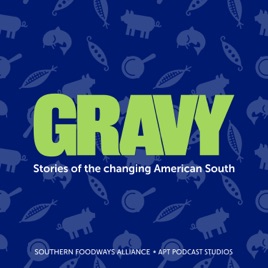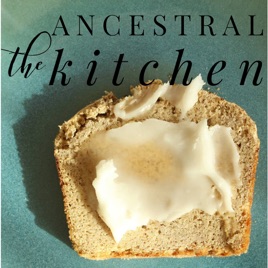
Advertise on podcast: Gravy
Rating
4.6 from
Country
This podcast has
223 episodes
Language
Publisher
Explicit
No
Date created
2014/11/06
Average duration
30 min.
Release period
13 days
Description
Gravy shares stories of the changing American South through the foods we eat. Gravy showcases a South that is constantly evolving, accommodating new immigrants, adopting new traditions, and lovingly maintaining old ones. It uses food as a means to explore all of that, to dig into lesser-known corners of the region, complicate stereotypes, document new dynamics, and give voice to the unsung folk who grow, cook, and serve our daily meals.
Social media
Check Gravy social media presence
Podcast episodes
Check latest episodes from Gravy podcast
Gravy Travels Due South
2024/02/26
If you're looking for a show that is a source for news, information, and perspectives from across North Carolina and the South, then you should really check out Due South from our public radio friends at WUNC—North Carolina Public Radio. Due South is a place to make sense of what’s happening in our community. The show takes deep dives into the news—while also providing a break from the news cycle with conversations on topics ranging from food and music to arts and culture.
Gravy is excited to share a special episode of Due South with you today. Join co-host Leoneda Inge as she takes a close look at the distinct flavors Black women in North Carolina are bringing to the beer and spirits industries, as well as the challenges they face breaking into the white and male-dominated market. She speaks with several women in the state of North Carolina who are changing the face of the local alcohol industry.
Due South is the perfect companion podcast to Gravy, especially if you’re looking for another narrative Southern podcast that tells stories that go beyond the headlines. Make sure to follow Due South on your favorite podcast app.
Learn more about your ad choices. Visit megaphone.fm/adchoices
more
The Miracle of Slaw and Fishes: Louisiana’s Lenten Fish Fries
2024/02/14
Order a catfish po-boy or a few pounds of crawfish in Acadiana any Friday between Mardi Gras and Easter, and you may be surprised to learn that your delight is another person’s sacrifice. The Catholic tradition of abstaining from meat during Fridays in Lent is alive and well in Southwest Louisiana, a region where more than a third identify as Catholic. Thanks to the long list of Catholic churches and restaurants that roll out an array of delectable seafood options on Lenten Fridays, it’s not much of a burden. St. Francis of Assisi in Breaux Bridge and the Knights of Columbus Council at St. Pius X in Lafayette both have long-standing Lenten fish fry traditions that bring together their communities and welcome anyone hungry for fried catfish, regardless of religion. Olde Tyme Grocery in Lafayette sells close to 2,300 seafood po-boys during the 40-day period. Religious abstinence never tasted so good.
The episode was reported and produced by Sarah Holtz. Sarah is an independent radio producer and documentary artist based in New Orleans.
Learn more about your ad choices. Visit megaphone.fm/adchoices
more
From Stuckey's to Buc-ee's
2024/01/31
Few companies have inspired more fanatical devotion among Texans than the convenience chain Buc-ee’s. Described by the New York Times as both a “Disneyland of roadside capitalism,” and the “through line of America’s second most sprawling state,” its iconic, buck-toothed beaver mascot has been spotted not just on billboards, but on wedding cakes and tattooed arms of its most loyal customers. Founded as a small-town gas station, today it boasts 47 locations across the South known for massive floor spaces brimming with souvenirs, fudge, BBQ stations, cases of jerky, and walls of branded snacks like “beaver nuggets.”
Yet unlike other treasured Lone Star enterprises like Whataburger, Blue Bell, or the grocery chain H-E-B, Buc-ee’s ascendance has been a fast, recent phenomenon. They are also far from the first convenience chain to endear themselves to travelers through reliably clean restrooms, kitschy gifts and road food. In fact, one could argue they stand on the shoulders of the Georgia-born Stuckey’s, whose nutty treats sparked a mid-century rest stop empire.
Today, both brands find themselves at a crossroads. Buc-ee’s is rapidly expanding, while following years of corporate mismanagement and decline, Stuckey’s is rebuilding itself one pecan log roll at a time.
In this episode we’ll ride shotgun with Gravy producer Evan Stern as he explores how food has shaped these companies' brand identities, how they’re grappling with change, and what their stories reveal about the past, present,t and future of snacking on the American road.
Along the way, we’ll step inside a Buc-ee’s that sprawls over 65,000 square feet, get to know some devoted customers and hear from journalist Eric Benson, who argues this chain has come to symbolize 21st century Texas. We’ll also meet Stephanie Stuckey who, following a career in politics and environmental law, now serves as the chair of Stuckey’s. She shares her grandfather’s journey from pecan broker to gas station magnate, how she envisions Stuckey’s evolving, and why the road trip remains ingrained in the company’s DNA.
The resulting piece is a profile of two brands who have shaped and continue to make American highways a “corridor of consumption.”
Learn more about your ad choices. Visit megaphone.fm/adchoices
more
Mahalia Jackson's Glori-Fried Chicken
2024/01/17
In addition to her work as an international recording artist and civil rights activist, the Queen of Gospel entered the restaurant business in the late 1960s with Mahalia Jackson’s Glori-fried Chicken. The fast food chain was more than a brand extension for the star; it was the first African American-owned franchise in the South. Producer Betsy Shepherd explores how Mahalia used the gospel bird to push for economic empowerment in the black community.
Betsy Shepherd produced this episode for Gravy.
Learn more about your ad choices. Visit megaphone.fm/adchoices
more
Hip To Be a Cube: Maggi Bouillon Unwrapped
2024/01/03
In the episode “It’s Hip to Be a Cube: Maggie Bouillon Unwrapped,” Gravy producers Katie Jane Fernelius and Ishan Thakore take a deeper look at a humble but ubiquitous pantry staple—the bouillon cube. As many home cooks know, these dehydrated cubes of salty, umami flavor dissolve in water to create a makeshift broth. But the result is much more than soup. For immigrants to the American South, for example, bouillon cubes carry powerful sentiments of nostalgia and home.
Approximately 120 million Maggi bouillon cubes are sold each day. It’s a testament to the reach and ubiquity of the Nestle brand, arguably the most notable brand of bouillon cubes—just as many people call a tissue a Kleenex, so do many people call bouillon cubes Maggi.
In fact, if you were to go to an international supermarket, you’d find dozens and dozens of varieties of Maggi. Some would be sold in packages labeled in Arabic, others in French or English… each with its own flavor profile specific to regional cuisines: Djon Djon. Golden Beef. Poulet. Tomato. Ginger and Garlic. Naija Pot.
Maggi’s diversity of flavor profiles speak to just how readily the little cube has been adopted into so many kitchens around the world. And it’s not uncommon for cooks to say it’s the secret ingredient to their favorite local dish.
So, how did Maggi manage to become both a global juggernaut and hometown hero?
In this episode, Fernelius and Thakore trace Maggi’s path from Swiss laboratories in the late nineteenth century, to Cubism, to postcolonial countries across the Global South, to a beloved Nigerian restaurant just outside of Atlanta, Georgia. They speak to Toyin Adesayo, chef and owner of Toyin Takeout in Marietta, Georgia; Nadia Berenstein, an award-winning food writer and scholar of flavor; and Nigerian chef, writer, and activist Tunde Wey. Through these conversations, they learn why the little bouillon cube has become so special to so many.
Learn more about your ad choices. Visit megaphone.fm/adchoices
more
Gravy Recommendation: Southern Songs and Stories
2023/12/29
If you appreciate Gravy, you'll likely enjoy Southern Songs and Stories. The episode we're sharing with you today features Jake Xerxes Fussell, a musician whose music is well-known in Oxford, Mississippi, the town the Southern Foodways Alliance calls home.
From Southern Songs and Stories:
In this series, we often spend time with artists and styles of music that are not celebrated in the mainstream, and our guest here is no exception. With a focus on music that is from artists living in the South and on music that has roots in the region, we are constantly talking with bluegrass, blues, country, rock, and Americana artists. These forms of music are immensely important to the history and legacy of original music in this country, but they seldom are associated with today’s biggest stars. One reason why we love those genres is simply because they became so popular, fueling one of America’s greatest exports to the world. But it is easy to get wrapped up in that history and culture and lose sight of other traditions that are not celebrated in the mainstream, nor are they a part of the narrative where roots music born in the South becomes foundational to a preponderance of popular music in the twentieth century. In this conversation with Jake Xerxes Fussell, I was reminded of that.
That episode is just one part of our conversation that took place in mid-May 2023 at the Albino Skunk Music Festival in Greer, SC. Jake played a solo set on guitar, and afterward we spoke about his deep roots in folklore, his fourth album Good and Green Again, being a DJ on WHUP in Hillsborough, NC, and more. This episode also features excerpts of music from his live set.
Learn more about your ad choices. Visit megaphone.fm/adchoices
more
Filipino Balikbayan is Homecoming in a Box
2023/12/20
Christmas is the time of year when many people line up at the Post Office to ship gifts to far-flung loved ones across the country, maybe even the world. In the Philippines, this practice is not just customary, but a state policy called the Balikbayan Program.
Balikbayan, which is the Tagalog word for “homecoming,” was first coined by President Ferdinand Marcos in 1973 when he launched a series of policies to encourage the large number of overseas Filipino workers to return home for Christmas in the Catholic country. He hoped they would spend their hard-earned foreign currencies in their home country, helping to bolster the Filipino economy. But, if they were not able to make it home, then he encouraged them to send tax-free “balikbayan boxes” in their place.
Balikbayan boxes are typically 3-foot-by-3-foot-by-3-foot boxes stuffed full of canned goods, candy bars, packaged cookies, toothpastes, deodorants, sweatshirts, shoes, and many other items.
Today, approximately half-a-million balikbayan boxes are shipped to the Philippines each month by Filipinos working overseas––and this number only increases further around Christmastime. Whole industries exist around the logistics of shipping balikbayan boxes: for example, in Houston, where 2.5 million Filipino immigrants live, companies like Forex Texas have been operating since the mid-1990s to safely ship balikbayan boxes to the Philippines. (These box companies are not uncommon in various Filipino enclaves across America.)
Balikbayan boxes are not just impressive economic operation, they also are a certified cultural practice and pop culture meme. Filipino comedian Mikey Bustos sang about balikbayan boxes in a video parodying Miley Cyrus’ “Wrecking Ball”:
“I got my balikbayan box, I waited for it for 2 months. I bet it's full of awesome stuff. Some Colgate and new briefs, imported corn beef, I got my balikbayan box, so full of imported products, I know I will feel so sosyal parang foreigner lang, thanks to my Mommy. I'll have Nikes on my feet!”
In this episode of Gravy, producer Katie Jane Fernelius examines the histories underlying the balikbayan box. She speaks with Royal Sumikat, a Filipino artist in Houston, who designed a whole exhibit based on the box. Royal draws upon her experience as a child in the Philippines receiving these boxes from her dad and reflects upon the economic and political realities that forced her dad to work overseas. Jade Alburo, a librarian at UCLA who focuses on the study of Southeast Asia and the Pacific Islands. discusses the impact of American colonialism in the Philippines and how it inspired what items are most coveted for balikbayan boxes. Gravy also explores how to frame the importance of balikbayan boxes to Filipino families living across borders.
SFA is proud to be a part of APT Podcast Studios.
We thank the following individuals for help with this episode:
Royal Sumikat
Jade Albur
Christy Panis Poisot
Featured music in this episode includes:
Talang Patnubay (Silen), Christmas in the Philippines, Bayanihan Philippine Dance Company - Smithsonian Folkways
Ang Pasko Ay Sumapit, Christmas in the Philippines, Bayanihan Philippine Dance Company - Smithsonian Folkways
"Calisson," by Blue Dot Studios
"We Collect Shiny Things," by Blue Dot Studios
"Waltz and Fury," by Blue Dot Studios
The image is from Royal Sumikat’s exhibit in Houston, Texas.
Learn more about your ad choices. Visit megaphone.fm/adchoices
more
What's Next for the Women of Mama Dip's Kitchen?
2023/12/06
In "What's Next for the Women of Mama Dip's Kitchen?" Gravy producer Leoneda Inge takes listeners to Mama Dip’s Kitchen, known for its chicken and dumplings and scrumptious homemade desserts. The restaurant has fed tourists, celebrities, and steady customers for nearly fifty years in Chapel Hill, North Carolina—so the community was shocked when the Council family voted earlier this year to sell the restaurant and the land around it.
Mildred “Mama Dip” Council was a celebrated entrepreneur. When she died in 2018, the restaurant continued, welcoming patrons at its longtime spot on Rosemary Street. Now, the Council family has a big decision to make. They have to figure out a way to continue growing the business and preserve Mama Dip’s legacy.
Mama Dip is a brand. She is a household name around town. She was not a popular alumna of The University of North Carolina at Chapel Hill or a star athlete—though this African American woman stood tall at 6’2”. But many students, staff, and residents have eaten her country cooking or tried to perfect a dish from one of her cookbooks.
Mama Dip had eight children, and several of them were cross-trained to operate every facet of the business. Her youngest child, Spring Council, is north of sixty-five years old, retirement age for many folks. The asking price for Mama Dip’s Kitchen—the building, not the brand—is $3.6 million. Early conversations included talk of building a more fast-casual restaurant, with a smaller staff, specializing in the restaurant’s top sellers, like the chicken and dumplings.
While the future of Mama Dip’s Kitchen is still up in the air, the family legacy lives on. Granddaughter Tonya Council recently opened her own cookie shop in Chapel Hill. Granddaughter Erika Council in Atlanta owns Bomb Biscuit Company. And daughter Annette Council continues to sell her Sweet Neecy cake mixes. For this episode, Inge talks to Spring Council and Erika Council, as well as some of Mama Dip’s loyal followers, to explore the legacy and future of this iconic Chapel Hill institution.
Learn more about your ad choices. Visit megaphone.fm/adchoices
more
Tasting the South in the San Fernando Valley
2023/11/22
In “Tasting the South in the San Fernando Valley,” producer Rebecca Katz tells the story of how three black women created a soul food institution in one of the whitest parts of the San Fernando Valley that still thrives today.
During the Second Great Migration in the 1940s, large numbers of Black Americans traveled west to Los Angeles, California. The Black population in Los Angeles increased nearly twelvefold from 1940 to 1970.
In this episode, we learn about the racial history of the San Fernando Valley specifically a suburb just north of the city of Los Angeles. While Los Angeles as a city was diversifying after the second great migration, certain parts of the Valley remained largely white due to its iron-clad race restrictions—some of the harshest in the nation. In the episode, we hone in on one small town at the Western tip of the valley called Chatsworth, which was 98% white in the 1980s.
Three Black women, Clara Huling, Roda Hadi, and Willie Stanford, were each already working in the restaurant industry in the Valley in the 1980s, not far from Chatsworth. They each had different ties to the South and they all missed Southern cooking and classic soul food. One night, they decided to open a restaurant—bringing classic soul food to the largely white valley. And they did just that. They came together and opened a tiny soul food spot in the unlikeliest of all places—Chatsworth.
Nearly 40 years after that grand opening, Clara’s granddaughter, Jessica Huling, still owns and operates the restaurant, which has been deemed some of the best soul food in Los Angeles by many reputable food outlets.
In this episode, we hear from Jessica about how the restaurant thrived in such a white area through the years. We explore how the restaurant has overcome the odds, evolved its customer base, and greatly influenced the Black community in the Valley today.
Learn more about your ad choices. Visit megaphone.fm/adchoices
more
Adaptation, Survival, Gratitude: A Lumbee Thanksgiving Story
2023/11/08
At this point, most of us know the Thanksgiving story about the Pilgrims and the Indians happily indulging in a joint feast is a vast oversimplification of what actually happened. But how many of us still have an idea of Native people that's stuck in the past? "People didn't believe that I was Native because I was from North Carolina," Lumbee Indian Malinda Maynor Lowery says. "The only thing they learned about Indians in school, maybe, was that we were removed from the Southeast."
In this first episode of Gravy, first shared almost 10 years ago today, meet a tribe of Indians who are very much still in the Southeast—and whose food reflects a distinct hybrid of Southern and Native history. The Lumbee's story is one that spans centuries, and includes new windows into periods you may think you know—like the Jim Crow era. Plus something you'll be eager to eat: the collard sandwich.
If you want more after that, check out these oral histories of the Lumbee community, done by the SFA's Sara Wood.
You might also want to read Malinda Maynor Lowery's book "Lumbee Indians in the Jim Crow South."
And, if you're dying to make your own collard sandwich, you can find a recipe for that and much more in Gloria Barton Gates' "The Scuffletown Cookbook."
Tina Antolini, Gravy's first producer, reported and produced this episode. Tina has worked in public radio for nearly 20 years. She was a senior producer for NPR's State of the Reunion, for which she won a Peabody and a national Edward R Murrow Award for her work.
Learn more about your ad choices. Visit megaphone.fm/adchoices
more
The Swamp Witches
2023/10/25
Winter mornings are serene in the cypress groves of the Mississippi Delta. There’s the glide of the canoe, and the gentle ripple of camouflage waders disappearing into waist-deep water. What finally breaks the pre-dawn quiet is the fire of a shotgun, and the splash of a Labrador Retriever. And then, there’s the laughter of a group of women. That’s the sound of Swamp Witches.
The Swamp Witches have been duck hunting together for nearly 20 years. Men are often surprised to stumble upon a half-dozen women—not in the company of fathers or husbands or brothers—out hunting. In this episode of Gravy, reporter-producer Dana Bialek goes hunting with the Swamp Witches and explores the rise in women hunters, how hunter recruitment is connected to the conservation of waterfowl habitat, and what it means to celebrate hunted game around the table.
Dana Bialek is a radio producer based in Brooklyn, New York.
A special thanks to Allison and Jim Crews for their hospitality and for making this story possible.
The music is this episode was from the album Mississippi Number One by Eden Brent of Greenville, Mississippi.
Some of Lila Sessum’s favorite recipes for game can be found in John Folse’s cookbook After the Hunt.
Learn more about your ad choices. Visit megaphone.fm/adchoices
more
Czech Out Texas Kolaches
2023/10/11
In “Czech Out Texas Kolaches,” Gravy producer Evan Stern invites listeners to join him on a return trip to his native Texas to explore the history, origins, and evolutions of kolaches through the voices of bakers of varying backgrounds and perspectives. This episode complements the oral history project Stern created for SFA, The Keepers of Kolaches: The Evolutions of Texas-Czech Baking.
Few pastries are more intertwined with the fabric of Central Texas than kolaches. With roots in the Czech Nation and owed to 19th Century Moravian immigrants, these soft, pillowy confections of yeasty dough with open centers of fruit, poppyseed or sweet cheese fillings have long provided humble links to the old country in small Texas towns like Halletsville, La Grange, West, and Schulenburg. Yet kolaches have also weathered many transformations under the Lone Star flag and have developed an identity that continues to change—and is, at times, challenging to define.
Historian and blogger Dawn Orsak explains how meat filled “klobasnikys” emerged and eventually came to become interchangeable with kolaches in the eyes of the broader public. She argues that Texas-Czech baking should be afforded the same respect as its European ancestors. “Fifty or sixty years after people started immigrating to Texas, what does traditional mean?” she asks. Acclaimed ninety-year-old baker Lydia Mae Faust also speaks to these traditions. She grew up preparing kolaches on her family farm with hand churned cottage cheese, and continues to share and teach her recipes to ensure their preservation.
Meanwhile, there’s Laos-born, Houston-based Vatsana Souvannavong. The owner of the bakery Koala Kolache, she’s on a mission to make kolaches nationally known, and has found in them a vessel for flavors as bulgogi and kimchi, chicken marsala, and Thai chicken and basil.
While these bakers’ cultural backgrounds vary, their stories ultimately reveal kolaches as emblematic of a changing, increasingly diverse Texas, South, and nation. The group is united in their enthusiasm and hopes for this doughy indulgence’s continuity.
Acknowledgments
Thanks to Vatsana Souvannavong, Dawn Orsak, Lydia Mae Faust, Denise Mazal, and Jerry Haisler
For Lydia Faust’s kolache recipe, click here.
Gravy is proud to be a part of APT Podcast Studios
Learn more about your ad choices. Visit megaphone.fm/adchoices
more
Podcast reviews
Read Gravy podcast reviews
Steveisokay2
2023/09/29
Excited to listen
Found from the doughboys podcast
leontheartist
2023/12/02
Somewhat informative
Good episodes highlighting restaurants and cuisines listeners may not be aware of or have experienced.
The part that gets me is in the soul food rest...
more
justletmepost
2023/10/01
Good content, but too many ads now
I’m glad Gravy got rescued and there are new episodes again, but I’m annoyed by how many ads the new host company is cramming into all the episodes, e...
more
CammyJu
2023/03/09
Intelligent and enjoyable!
I discovered this show through Vanishing Postcards, and you better believe I’ll be sticking around for some more Gravy!
shortspark222
2023/03/02
Galveston
What a great vignette about Galveston, TX: The history, the immigrant impact (particularly the Italians) and the fascinating stories of the character...
more
Bella in houston
2023/03/01
Delish and delightful
I have really enjoyed your offerings from Evan Stern. He’s got a natural talent for drawing the listener in to the story. I’ve really enjoyed them al...
more
sahorst
2023/03/01
Thoughtful, Informative, a great escape!
Super impressed by the stories of the SFA showcases—and have been absolutely LIVING for these Texas episodes!
JJacks93
2021/06/09
From Alabama
I’m a massage therapist and sometimes I get bored during a massage so I put in an ear bud to listen to podcasts and pass the time faster. I listened t...
more
play overruled
2022/03/01
This is weird
I joined SFA for food, recipes fun. This podcast is some strange NPR like show with unintelligent commentary that is in a word weird.
The content is...
more
hharisodnf r
2020/09/01
Love your show.
I just found your podcast and I love it. I love the information you have and the guests that you have on the show. Keep up the good work.
Podcast sponsorship advertising
Start advertising on Gravy & sponsor relevant audience podcasts
You may also like these food Podcasts

4.6
383
55
GuildSomm Podcast
GuildSomm

4.6
229
304
The Food Programme
BBC Radio 4

4.6
395
169
Green Eggs and Dan
Cloud10

4.6
46
207
Food Safety Matters
Food Safety Magazine

4.6
185
56
The Crumb - Bake from Scratch
Brian Hart Hoffman

4.4
406
87
Homemade
Allrecipes

4.8
982
197
Breaking Bread with Tom Papa
All Things Comedy

4.8
109
83
Ancestral Kitchen
Alison Kay & Andrea Huehnerhoff

4.8
1423
457
Food for Thought: The Joys and Benefits of Living Vegan
Colleen Patrick-Goudreau

4.7
3269
42
Hello Rossipes
Ross Mathews | Cumulus Podcast Network



